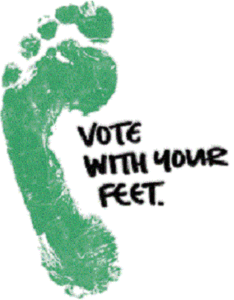The Volokh Conspiracy
Mostly law professors | Sometimes contrarian | Often libertarian | Always independent
My "Jurist" Article on Expanding Freedom of Choice by Empowering More People to Vote With their Feet
The combination of foot voting and decentralization of power can offer people more and better choices than are available at the ballot box.

Earlier today, the Jurist published my article on how we can expand political freedom by empowering more people to vote with their feet.
Here is an excerpt:
The United States has just completed a historically divisive election. As I write, the winner of the presidential election is not yet definitively known, though it seems highly likely that Democratic candidate Joe Biden will ultimately prevail when all the votes are counted. Whatever the outcome, many millions of people will be deeply distressed at the prospect that the levers of power in Washington will be controlled by a party they hate and fear. And individual voters of all viewpoints have little chance of making a choice that actually affects the outcome. We can alleviate these problems by expanding opportunities for people to "vote with their feet."
Ballot box voting has many virtues. But as a mechanism for political choice, it falls short in two crucial ways: enabling people to make meaningful decisions and incentivizing them to make well-informed choices. On both dimensions, we can do better by empowering foot voting….
Effective freedom requires the ability to make a decisive choice. A person does not have meaningful religious freedom if she has only a 1 in 60 million chance of being able to determine which religion she wishes to practice. A 1 in 60 million chance of deciding what views you are allowed to express does not qualify as meaningful freedom of speech. What is true of freedom of speech and religion is also true of political freedom. A person with only an infinitesimal chance of affecting what kind of government policies he or she is subjected to has little, if any, genuine choice….
Things are very different when people "vote with their feet." When you decide what jurisdiction to live in, that's a decision you have real control over. For that very reason, there is a strong incentive to seek out relevant information. The same applies to private-sector decisions and choices about international migration. Most people probably devote more time and effort to deciding what television set or smartphone to buy, than to decide who to vote for in any election. The reason is not that the television set is more important than who governs the country, but that choice you make has real effects.
In the United States, foot voters can potentially choose between fifty states and thousands of local governments. They can also opt for private planned communities, such as condominium associations, which provide many services similar to those offered by local governments. Some 69 million Americans already live in private planned communities, belying the notion that they are only for the wealthy few. Widespread foot voting opportunities can benefit even many who do not actually move, by incentivizing states and localities to compete with each other by improving their policies….
We can make foot voting more accessible by decentralizing more policy issues to states, localities, and the private sector, and by loosening restrictions on the establishment of new private communities. That will increase the range of options available to potential foot voters and reduce moving costs. It is cheaper and easier to move from one state to another than to leave the US entirely, and cheaper still to choose between localities or private sector organizations….
Decentralization can also mitigate the painful reality that, whoever ultimately wins the 2020 elections at the federal level, many millions of people will be forced to accept a variety of government policies they deeply abhor. By devolving power to the state and local level and to the private sector, we can expand the range of policy options available to Americans. Those who lose out at the national level can still live under policies that match their preferences at lower levels of government, or in private institutions. By lowering the stakes of national elections, such diversity can mitigate the poisonous political polarization and partisan hatred that has infected American politics.
The article is in large part based on ideas developed much more fully in my recent book Free to Move: Foot Voting, Migration, and Political Freedom. The Introduction to the book, which provides an overview of the rest, is available for free download here.
I should note that the article was written and published before major media organizations called the election for Joe Biden in the late morning.


Show Comments (16)